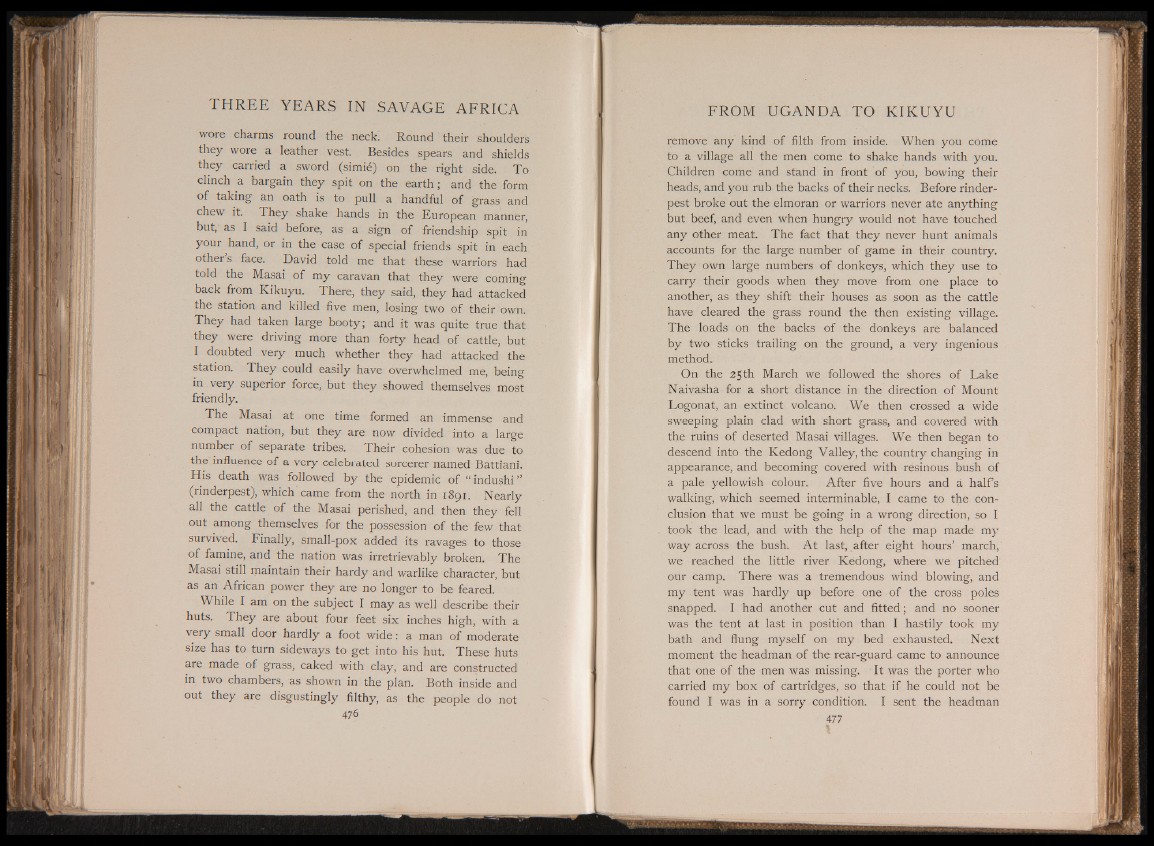
wore charms round the neck. Round their shoulders
they wore a leather vest. Besides spears and shields
they carried a sword (simi<£) on the right side. To
clinch a bargain they spit on the earth; and the form
of taking an oath is to pull a handful of grass and
chew it. They shake hands in the European manner,
but, as I said before, as a sign of friendship spit in
your hand, or in the case of .special friends spit in each
others face. David told me that these warriors had
told the Masai of my caravan that they were coming
back from Kikuyu. There, they said, they had attacked
the station and killed five men, losing two of their own.
They had taken large booty; and it was quite true that
they were driving more than forty head of cattle, but
I doubted very much whether they had attacked the
station. They could easily have overwhelmed me, being
in very superior force, but they showed themselves most
friendly.
The Masai at one time formed an immense and
compact nation, but they are now divided into a large
number of separate tribes. Their cohesion was due to
the influence of a very celebrated sorcerer named Battiani.
His death was followed by the epidemic of “ indushi ”
(rinderpest), which came from the north in 1891. Nearly
all the cattle of the Masai perished, and then they fell
out among themselves for the possession of the few that
survived. Finally, small-pox added its ravages to those
of famine, and the nation was irretrievably broken. The
Masai still maintain their hardy and warlike character, but
as an African power they are no longer to be feared.
While I am on the subject I may as well describe their
huts. They are about four feet six inches high, with a
very small door hardly a foot wide: a man of moderate
size has to turn sideways to get into his hut. These huts
are made of grass, caked with clay, and are constructed
in two chambers, as shown in the plan. Both inside and
out they are disgustingly filthy, as the people do not
476
remove any kind of filth from inside. When you come
to a village all the men come to shake hands with you.
Children come and stand in front of you, bowing their
heads, and you rub the backs of their necks. Before rinderpest
broke out the elmoran or warriors never ate anything
but beef, and even when hungry would not have touched
any other meat. The fact that they never hunt animals
accounts for the large number of game in their country.
They own large numbers of donkeys, which they use to
carry their goods when they move from one place to
another, as they shift their houses as soon as the cattle
have cleared the grass round the then existing village.
The loads on the backs of the donkeys are balanced
by two sticks trailing on the ground, a very ingenious
method.
On the 25th March we followed the shores of Lake
Naivasha for a short distance in the direction of Mount
Logonat, an extinct volcano. We then crossed a wide
sweeping plain clad with short grass, and covered with
the ruins of deserted Masai villages. We then began to
descend into the Kedong Valley, the country changing in
appearance, and becoming covered with resinous bush of
a pale yellowish colour. After five hours and á halfs
walking, which seemed interminable, I came to the conclusion
that we must be going in a wrong direction, so I
took the lead, and with the help of the map made my
way across the bush. At last, after eight hours’ march,
we reached the little river Kedong, where we pitched
our camp. There was a tremendous wind blowing, and
my tent was hardly up before one of the cross poles
snapped. I had another cut and fitted; and no sooner
was the tent at last in position than I hastily took my
bath and flung myself on my bed exhausted. Next
moment the headman of the rear-guard came to announce
that one of the men was missing. It was the porter who
carried my box of cartridges, so that if he could not be
found I was in a sorry condition. I sent the headman